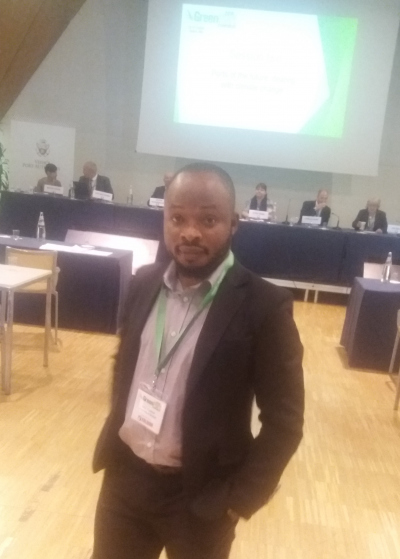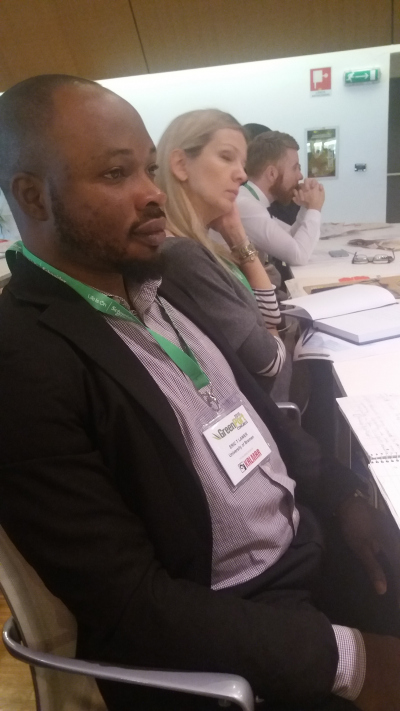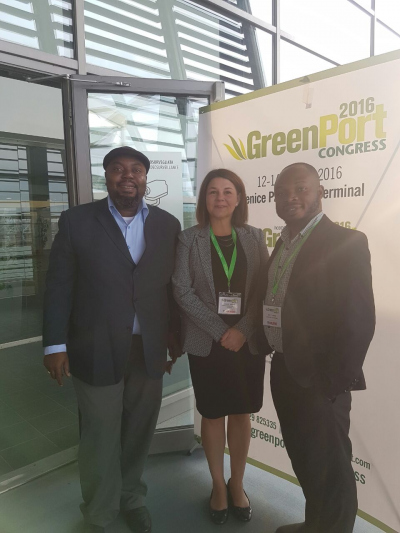Die Inhalte dieser Seite sind leider nicht auf Deutsch verfügbar.
Seitenpfad:
- Graduate School GLOMAR
- PhD student reports
- Conference Reports
- Conference Reports 2016
- Eric Tamatey Lawer
Eric Tamatey Lawer
Report of GLOMAR PhD student Eric Tamatey Lawer about his participation in the Green Port Congress 2016 in Venice, Italy from 12 - 14 October 2016
About the Conference
Organized by Mercator Media and Greenport magazine, the Green Port Conference (congress) was hosted by the Port of Venice, Italy from the 12-14 October 2016 with over 200 delegates or participants mostly from the port industry, Governmental and EU agencies, technology companies, port environmental services companies and students.
The event involved seven (7) sessions of talk with several key note addresses as well as working group discussions which centered on protecting the environment at ports and general issues about sustainability of ports. These sessions were not overlapping thereby enabling me to take part in all. The congress highlighted innovations in technology and renewable energy as an important component of greening ports and generally provided a platform where practical solutions through case studies were presented. One major theme that emerged throughout the sessions was that there is a major gap between green port policy and practice which needs to be addressed. At the end of the conference, it was generally agreed across board that the only way to close this gap is through knowledge sharing or sharing of best practices through networking events and collaborative programs. These networking events is where the standards and norms are built. Also that effective communication with all stakeholders at the port is very essential. There is the need for port authorities to collaborate with all stakeholders working within the port as this can help their operations to become more efficient, competitive and greener and that will lead to a win-win situation for everyone.
Participant Observer
I took part in the conference as a participant observer. This method allowed me to link theory and reality. The Greenport conference as a networking event allowed me to experience what network activities entail concretely. I have conversations with those involved in the network. This allowed me not only to notice network dynamics but also to ask participants from various regions, ports and companies about their experiences and why they are taking part in the event. It also helped me to understand which actors were pushing which best practices and why. For example, it was evident that the technology and port energy infrastructure companies were more of those pushing for the agenda of ports switching to the use of solar, wind and a new one that was introduced, wave energy. This allowed me to understand theoretical constructs of network structure and logic. The internal power dynamics between participants were observable.
Short interviews were held with key actors whom I identified will be useful for my project. Detailed or in-depth interview could not be conducted due to the packed nature of the conference, however making the contacts and short interviews or interactions were useful in three ways. Firstly, it offered me an opportunity to introduce my PhD project to these actors and to get feedback from them. Secondly, it offered me the chance to get their contacts, arrange for interviews with them and to get the assurance that they will respond to my calls and mails any time I have some questions for them. Thirdlyy, the contacts that were made and materials gathered will be used to refine my conceptual take and the field research strategy. Observations and interviews are crucial for exploratory research and my participation in the above conference achieved just that.
My Contribution
As a participant observer, I was able to contribute to the discussions and situate my PhD project in the discussions although I did not present a paper since the Green Port Congress was a specific gathering of the maritime industry players and there was generally no opportunity for scientists to present their research. I was involved in the plenary sessions, Question and Answers session as well as took part in the working group (Port Expansion and Nature Protection). Discussions centred on port expansions and funding requirements, environmental aspects at ports, working to reduce noise at ports, achieving UN sustainable goals through port activities to mention a few.
In conclusion, for giving me the possibility to attend this conference, I would like to thank GLOMAR and the Sustainability Research Centre (artec) for the financial support.
Organized by Mercator Media and Greenport magazine, the Green Port Conference (congress) was hosted by the Port of Venice, Italy from the 12-14 October 2016 with over 200 delegates or participants mostly from the port industry, Governmental and EU agencies, technology companies, port environmental services companies and students.
The event involved seven (7) sessions of talk with several key note addresses as well as working group discussions which centered on protecting the environment at ports and general issues about sustainability of ports. These sessions were not overlapping thereby enabling me to take part in all. The congress highlighted innovations in technology and renewable energy as an important component of greening ports and generally provided a platform where practical solutions through case studies were presented. One major theme that emerged throughout the sessions was that there is a major gap between green port policy and practice which needs to be addressed. At the end of the conference, it was generally agreed across board that the only way to close this gap is through knowledge sharing or sharing of best practices through networking events and collaborative programs. These networking events is where the standards and norms are built. Also that effective communication with all stakeholders at the port is very essential. There is the need for port authorities to collaborate with all stakeholders working within the port as this can help their operations to become more efficient, competitive and greener and that will lead to a win-win situation for everyone.
Participant Observer
I took part in the conference as a participant observer. This method allowed me to link theory and reality. The Greenport conference as a networking event allowed me to experience what network activities entail concretely. I have conversations with those involved in the network. This allowed me not only to notice network dynamics but also to ask participants from various regions, ports and companies about their experiences and why they are taking part in the event. It also helped me to understand which actors were pushing which best practices and why. For example, it was evident that the technology and port energy infrastructure companies were more of those pushing for the agenda of ports switching to the use of solar, wind and a new one that was introduced, wave energy. This allowed me to understand theoretical constructs of network structure and logic. The internal power dynamics between participants were observable.
Short interviews were held with key actors whom I identified will be useful for my project. Detailed or in-depth interview could not be conducted due to the packed nature of the conference, however making the contacts and short interviews or interactions were useful in three ways. Firstly, it offered me an opportunity to introduce my PhD project to these actors and to get feedback from them. Secondly, it offered me the chance to get their contacts, arrange for interviews with them and to get the assurance that they will respond to my calls and mails any time I have some questions for them. Thirdlyy, the contacts that were made and materials gathered will be used to refine my conceptual take and the field research strategy. Observations and interviews are crucial for exploratory research and my participation in the above conference achieved just that.
My Contribution
As a participant observer, I was able to contribute to the discussions and situate my PhD project in the discussions although I did not present a paper since the Green Port Congress was a specific gathering of the maritime industry players and there was generally no opportunity for scientists to present their research. I was involved in the plenary sessions, Question and Answers session as well as took part in the working group (Port Expansion and Nature Protection). Discussions centred on port expansions and funding requirements, environmental aspects at ports, working to reduce noise at ports, achieving UN sustainable goals through port activities to mention a few.
In conclusion, for giving me the possibility to attend this conference, I would like to thank GLOMAR and the Sustainability Research Centre (artec) for the financial support.





